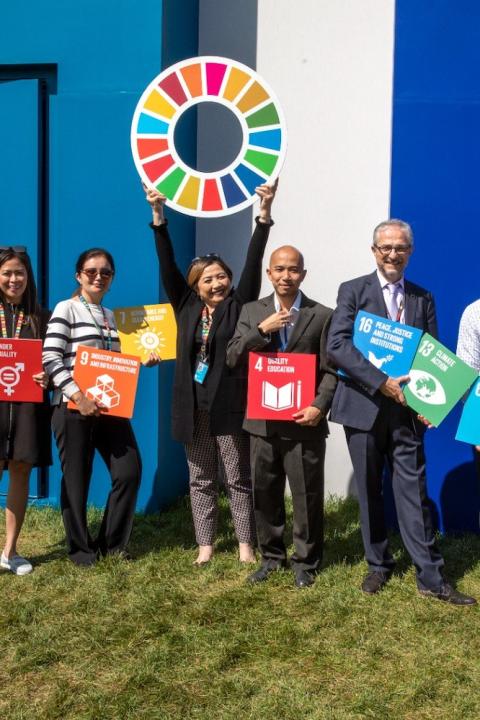
Energy Saving Week is an nationwide initiative that promotes energy conservation and sustainable living practices in the UK through various educational activities and events. During Energy Saving Week, individuals and businesses are encouraged to actively reduce their energy consumption and make more environmentally friendly choices.
This could involve simple actions such as turning off lights when not in use, insulating homes properly, using energy efficient appliances, and reducing waste. The week also aims to raise awareness about the impact of energy consumption on the environment and the importance of sustainable living.
By participating in Energy Saving Week, individuals can not only save money on their energy bills but also contribute to the global efforts of reducing carbon emissions and conserving natural resources. It is a great opportunity for everyone to learn and adopt energy-saving habits that can have a positive and lasting impact on the environment.
The Importance Of Energy Efficiency
Energy efficiency plays a crucial role in our daily lives, and its importance cannot be understated. Not only does it help us save money by reducing energy consumption, but it also has a significant positive impact on the environment. By adopting energy-efficient practices in our homes and workplaces, we can minimize greenhouse gas emissions and reduce our carbon footprint. This, in turn, helps combat climate change and preserve our planet for future generations.
There are numerous benefits of energy efficiency in our daily lives. Firstly, it helps lower our electricity bills, allowing us to allocate those savings towards other essential needs. Secondly, energy-efficient appliances and lighting systems have a longer lifespan and require less maintenance, saving us money in the long run. Moreover, energy efficiency promotes better indoor air quality by reducing the need for fossil fuel combustion, leading to improved respiratory health for individuals.
In addition to personal benefits, energy efficiency also contributes to a healthier environment. Unnecessary energy consumption leads to increased pollution and resource depletion. By making conscious choices to reduce energy waste, such as using energy-saving bulbs, insulating our homes, and practicing mindful consumption of electricity, we can decrease our overall environmental impact. However, it is essential to note that the responsibility of energy efficiency does not solely rest on individuals. Governments, businesses, and industries also play a pivotal role in implementing policies and utilizing sustainable practices to reduce energy waste on a larger scale.
Key Tips For Energy Savings
Understanding energy consumption in different areas of our lives: To start saving energy, it is crucial to understand where it is being consumed. From lighting and appliances to heating and cooling systems, evaluating energy consumption in different areas can help identify areas for improvement.
Implementing energy-saving strategies at home: Taking small steps at home can lead to significant energy savings. Adjusting thermostat settings, using energy-efficient light bulbs, unplugging electronics when not in use, and properly insulating the house are effective ways to save energy and reduce utility bills.
Energy-efficient practices in the workplace: Businesses can play a role in energy conservation by implementing simple yet impactful strategies. Encouraging employees to turn off lights and equipment when not in use, utilizing natural lighting, and optimizing heating and cooling systems can contribute to a more energy-efficient workplace.
Efficient Energy Use In Different Sectors
Efficient energy use is crucial across various sectors to reduce our carbon footprint and promote sustainability. The transportation industry plays a significant role in energy-saving practices. By employing fuel-efficient vehicles, optimizing routes, and implementing eco-driving techniques, companies can significantly minimize fuel consumption and greenhouse gas emissions. Adopting electric vehicles and investing in clean, renewable energy sources further contribute to a greener transportation system.
In the manufacturing and production sector, energy efficiency is essential for reducing energy wastage and improving overall sustainability. Implementing energy-saving technologies, such as LED lighting and automated systems, can significantly reduce energy consumption and operational costs. Proper maintenance of equipment and regular energy audits also help identify areas for improvement and optimize energy usage.
The agriculture sector also benefits from energy-saving practices. Utilizing innovative irrigation systems, such as drip irrigation or precision agriculture techniques, can minimize water and energy wastage. Implementing energy-efficient equipment and applying sustainable farming practices further contribute to reducing the sector’s carbon footprint.
Energy-efficient Technologies And Innovations
Discover the latest energy-efficient technologies and innovations during Energy Saving Week. From smart home systems to efficient appliances, these solutions offer sustainable options to reduce energy consumption and minimize environmental impact.
Overview Of Smart Home Systems And Their Energy-saving Capabilities
Smart home systems have revolutionized the way we interact with our homes, enabling us to control various devices and appliances remotely. These systems utilize advanced technologies such as artificial intelligence and machine learning to optimize energy consumption. With features like smart thermostats, automated lighting, and smart plugs, homeowners can easily monitor and adjust their energy usage, leading to significant energy savings. By analyzing data on energy consumption patterns and user preferences, these smart home systems dynamically adjust energy usage to minimize waste. This not only helps reduce electricity bills but also promotes a more sustainable lifestyle by conserving energy resources.
Introduction To Renewable Energy Sources For Sustainable Electricity Generation
Renewable energy sources, such as solar, wind, hydro, and geothermal power, play a crucial role in sustainable electricity generation. These sources harness natural resources without depleting them, offering an environmentally friendly alternative to fossil fuels. Solar panels convert sunlight into electricity, wind turbines harness the power of wind, hydroelectric plants utilize flowing water, and geothermal energy utilizes the earth’s heat. The adoption of renewable energy sources not only reduces carbon emissions but also creates opportunities for decentralized energy generation, improving energy security. With advancements in technology, these renewable energy sources have become more accessible, cost-effective, and efficient, paving the way for a cleaner and greener future.
The Potential Of Energy Storage Technologies In Minimizing Energy Waste
| Energy Storage Technology | Benefits |
|---|---|
| Battery Storage Systems | – Store excess electricity for later use – Reduce demand during peak hours – Provide backup power during outages |
| Pumped Hydro Storage | – Store excess energy in the form of potential energy – Release stored energy during high demand – High energy storage capacity |
| Compressed Air Energy Storage | – Store energy using compressed air – Release stored energy for electricity generation – Scalable and cost-effective |
| Flywheel Energy Storage | – Store kinetic energy in a spinning flywheel – Rapidly respond to fluctuations in energy supply and demand – Long lifespan and minimal maintenance |
Energy storage technologies are essential in minimizing energy waste by storing excess energy and releasing it when needed. Battery storage systems, such as lithium-ion batteries, are commonly used in residential and commercial settings to store surplus energy from renewable sources like solar panels. Pumped hydro storage, compressed air energy storage, and flywheel energy storage offer large-scale solutions to balance grid demand and supply, optimize intermittent renewable energy generation, and ensure stable power delivery. These energy storage technologies contribute to grid stability, enable renewable energy integration, and reduce reliance on fossil fuel-based power generation.
Policy And Regulatory Measures For Energy Efficiency
Energy saving practices have become an important aspect of sustainability efforts worldwide. To promote energy efficiency, governments have implemented various policy and regulatory measures. These initiatives aim to reduce energy consumption and carbon emissions, aligning with international agreements.
Government initiatives play a crucial role in fostering energy-saving practices. Through awareness campaigns, subsidies, and incentives, governments encourage individuals and businesses to adopt energy-efficient technologies and practices.
Energy efficiency standards are established for appliances and buildings. These standards ensure that products and structures meet specific energy-saving criteria. Compliance with these standards is essential to conserve energy and reduce wastage.
Furthermore, international agreements highlight the importance of energy efficiency. These agreements prioritize the reduction of energy consumption and carbon emissions on a global scale. Nations work together to implement strategies and share best practices to achieve these goals.
| Agreement | Focus |
|---|---|
| Paris Agreement | Limiting global temperature rise to well below 2 degrees Celsius |
| Montreal Protocol | Phasing out substances that deplete the ozone layer |
| Energy Charter Treaty | Encouraging energy efficiency and conservation |
By implementing these policy and regulatory measures, governments aim to create an energy-efficient future, reduce environmental impact, and ensure sustainable development for generations to come.

Credit: www.triplepundit.com
Education And Awareness For Energy Conservation
The importance of educating individuals on energy efficiency cannot be overstated. By providing comprehensive information and raising awareness, we can empower people to make conscious choices that contribute to a greener and more sustainable future.
Raising public awareness through campaigns and events is an effective way to reach a wide audience. These initiatives can highlight the benefits of energy conservation and provide practical tips on how to reduce consumption.
Engaging the youth in energy-saving efforts is crucial for long-term sustainability. By integrating energy conservation into educational curricula and promoting youth-led initiatives, we can instill eco-friendly habits early on and inspire the next generation of environmental leaders.
Partnerships And Collaborations For Energy Efficiency
The collaboration between governments, businesses, and communities is crucial in achieving energy efficiency goals and promoting sustainable development. Successful partnerships in this area have demonstrated the positive impact that collective efforts can have on reducing energy consumption and minimizing environmental impact.
Several case studies highlight the effectiveness of collaborations in energy-saving initiatives. For example, a partnership between a local government and a utility company resulted in the implementation of energy-efficient infrastructure, leading to significant energy savings for the community. Similarly, a collaboration between a manufacturing company and an energy consultancy resulted in the adoption of innovative technology and practices, resulting in reduced energy consumption and cost savings.
The role of financial institutions in funding energy efficiency projects
Financial institutions play a crucial role in supporting energy efficiency projects by providing funding and resources. They offer loans, grants, and incentives to businesses and communities that aim to improve energy efficiency. By investing in such projects, financial institutions not only contribute to environmental sustainability but also benefit from long-term cost savings and increased profitability.
Future Perspectives: Advancements In Energy Efficiency
The future of energy efficiency holds great promise, thanks to emerging technologies and innovations. One such advancement is the utilization of artificial intelligence (AI) in optimizing energy consumption. AI systems can analyze large amounts of data in real-time and make accurate predictions to optimize energy usage. This includes adjusting energy consumption based on demand, weather patterns, and user behavior, ultimately reducing waste and improving overall efficiency.
Another important aspect of future perspectives in energy efficiency is the continuous improvement of building sustainability. Sustainable architecture and construction techniques are being developed to minimize energy consumption in buildings. This includes green building materials, efficient insulation, and alternative energy sources such as solar panels and geothermal systems. By adopting these practices, we can create a sustainable future where buildings are energy-efficient and environmentally friendly.
Frequently Asked Questions For Energy Saving Week
What Is Big Energy Saving Week?
Big Energy Saving Week is an annual event focused on promoting energy efficiency and reducing energy consumption. It provides information, tips, and resources to help individuals and businesses make energy-saving choices to save money and protect the environment.
What Is The Theme Of Energy Star Day 2023?
The theme of Energy Star Day 2023 is promoting sustainable energy practices for a greener future.
What Is World Energy Conservation Day?
World Energy Conservation Day is observed to raise awareness about the importance of saving energy. It aims to promote sustainable practices and reduce energy consumption. This global event encourages individuals and organizations to adopt energy-saving measures to protect the environment and combat climate change.
What Is Energy Awareness Month?
Energy Awareness Month is a designated time to encourage understanding and conservation of energy.
Conclusion
As Energy Saving Week comes to an end, it is crucial to remember the importance of conserving energy not just for a week, but for a lifetime. By adopting simple habits like turning off lights when not in use, adjusting thermostats, and using energy-efficient appliances, we can make a significant impact on our planet’s well-being.
Let’s continue to be mindful of our energy consumption and work together towards a more sustainable future.






